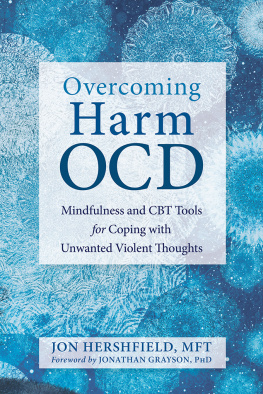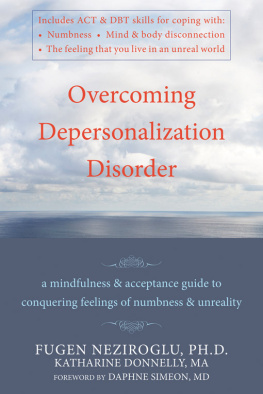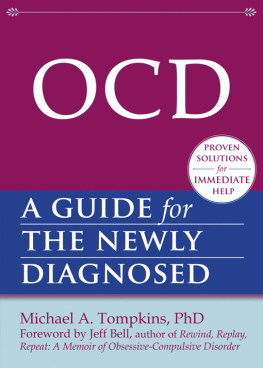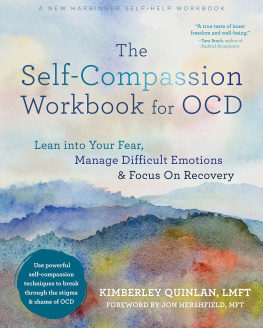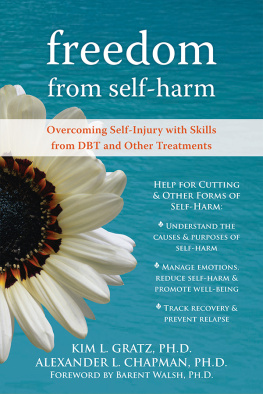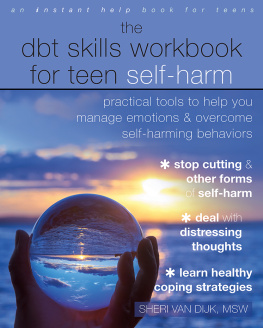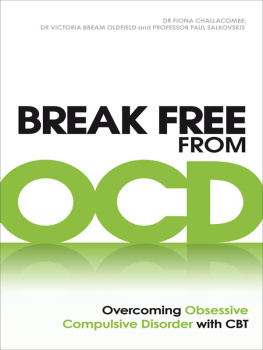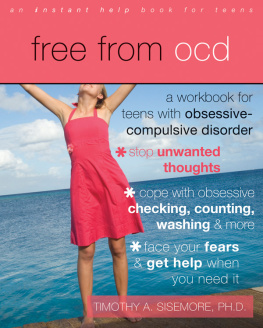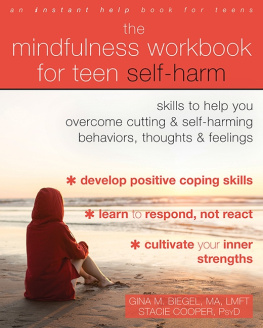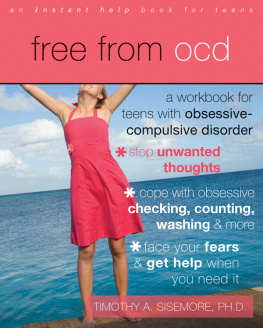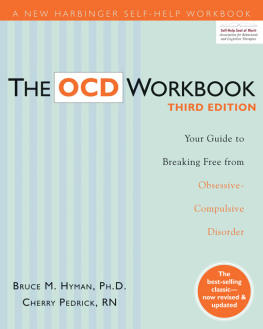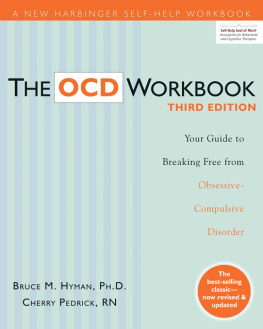If you have obsessions and compulsions related to the fear of harm, you should have this book! Jon Hershfield has an engaging writing style and a keen understanding of this problem that he passes along to the reader. Most importantly, he pulls together scientifically supported interventions into a useful self-help format. The numerous illustrations and examples will help you implement these strategies and overcome your harm-related OCD symptoms.
Jonathan S. Abramowitz, PhD , professor in the department
of psychology at the University of North Carolina (UNC) at Chapel Hill, and director of the UNC Anxiety and Stress Clinic
I have often thought of harming Jon, since I am jealous that he writes these really good books that I wish I had written instead of him. But I will sit with that thought and just be happy with the fact that I have a great reference to refer my patients and my students to when questions of Harm OCD arise in therapy and supervision. Good work, Jon. This book will be a great addition to the OCD literature. Just watch your back
Patrick B. McGrath, PhD , assistant vice president and
residential services clinical director at AMITA Health,
Foglia Family Foundation Residential Treatment Center
Overcoming Harm OCD is a remarkable contribution to the self-help literature on OCD. Hershfield has a masterful way of presenting complex concepts in an easy-to-understand manner and then linking them with effective therapeutic strategies. This book will be a valuable resource for individuals with Harm OCD, as well as applied practitioners who work with individuals with OCD or who simply want to learn more.
Eric Storch, PhD , vice chair, professor, and McIngvale
Presidential Endowed Chair at the Menninger Department of Psychiatry and Behavioral Sciences at Baylor College of Medicine
If you have Harm OCD, the best thing you can do is work with a skilled therapist trained in cognitive behavioral therapy (CBT) for OCD like Jon Hershfield. The next best thing is to use Overcoming Harm OCD to help yourself. If you do find a good therapist, they may recommend the book too; I know I will recommend it for my Harm OCD patients.
James Claiborn, PhD, ABPP, ACT , psychologist specializing
in OCD and related disorders, diplomate of the American Board
of Professional Psychology in Counseling Psychology, diplomate
and founding fellow of the Academy of Cognitive Therapy, and coauthor of The Habit Change Workbook and The BDD Workbook
Overcoming Harm OCD is an invaluable resource for anyone afflicted by inexplicable violent thoughts that they are terrified of acting upon, even while realizing their fears are irrational. The author, OCD therapist Jon Hershfield, writes with a deep compassion for all who suffer from Harm OCD, but too often wont seek the help they need due to unwarranted feelings of shame. In this easily readable, inspiring, and informative book, he expertly explains why the best way to deal with Harm OCD is to lean into it and learn how to live with uncertainty. Im putting it on my highly recommended list.
Jonathan Hoffman, PhD, ABPP , licensed psychologist,
cofounder and clinical director of the Neurobehavioral Institute and NBI Ranch in Southeast Florida, member of the Scientific
and Clinical Advisory Board of the International OCD Foundation (IOCDF), and author of Stuck
Whether you battle violent obsessions as a sufferer or treatment provider, Jon Hershfields Overcoming Harm OCD will prove to be a potent weapon in your arsenal. As one of the nations most respected OCD psychotherapists and authors, Jon offers his wisdom and wit in a wonderfully organized and enjoyable-to-read format. His masterful integration of components of cognitive therapy, exposure and response prevention (ERP), acceptance and mindfulness, and self-compassion provide the reader with very practical and effective ways to deflate the debilitating distress that OCD delivers.
Charles Brady, PhD, ABPP , director of the OCD and anxiety program at the Lindner Center of HOPE; vice president at
OCD Midwest; associate professor in the department of
psychiatry and behavioral neuroscience at the University of Cincinnati College of Medicine
Overcoming Harm OCD breaks down the complexity of Harm OCD into easy-to-understand and practical language. Jon Hershfields masterful description of unwanted violent obsessions will be greatly appreciated by those affected by these symptoms. His step-by-step instructions and helpful road map for incorporating acceptance and self-compassion are sure to encourage, strengthen, and enhance CBT treatment. This is a must-have resource for clients and professionals alike!
Amy Jacobsen, PhD , licensed psychologist specializing in
the treatment of OCD in Kansas, and coauthor of
Childhood Anxiety Disorders
You arent crazy or bad; you are human. Being human means dealing with difficult things, and OCD is a difficult thing, albeit a very difficult thing. Jons book addresses the concerns you may have around these challenging thoughts of harm; makes you feel a little bit more normal; and focuses on helping you through it using examples, exercises, and questions. All wrapped in the gold-standard science of CBT for OCD, and supported by mindfulness and self-love. Jon addresses the ways one deals with shame, an often-overlooked emotion that holds back recovery. Having interviewed Jon a few times, I can confidently say that he knows his stuff, but more importantly, he cares.
Stuart Ralph , The OCD Stories
If you have OCD and suffer from violent obsessions, this is the book you need! Jon Hershfield understands the depth of how frightening harm obsessions can be and the intricacies involved when seeking reassurance from the uncertainty they provoke. His compassion for OCD sufferers is demonstrated on every page, and his guidance and knowledge about applying well-established treatment components to face specific harm obsessions offers a clear path to reclaiming your life from OCD. Whether you suffer from harm obsessions or treat clients who do, this book will be become your go-to resource!
Joan Davidson, PhD , codirector of the San Francisco Bay Area Center for Cognitive Therapy; assistant professor in the clinical science program at University of California, Berkeley; and author
of Daring to Challenge OCD
Hershfield has done it! Using straight-up honesty, compassion, and appropriately placed humor, he has written a body of work tackling the untouchable subject of harm obsessions in OCD. I predict that this book becomes the go-to reference for current and future generations of OCD sufferers, their loved ones, and treating clinicians. Hershfield has deftly avoided being drawn into providing excessive reassurance, which OCD would surely love! Rather, he gifts the reader with tools to live with the uncertainty that we must all face as human beingsspecifically with respect to our past and future actions.
S. Evelyn Stewart, MD , associate professor in the department
of psychiatry at the University of British Columbia and director of the Provincial OCD Program at the BC Childrens Hospital
If you have Harm OCD, reading this book will be life-changing. No more thinking youre going crazy. No more avoiding the life you used to love. No more thinking your thoughts arent normal, because theyand youare. In Overcoming Harm OCD , Jon compassionately demonstrates the H.E.A.Ling power of standing up to your OCD so you can build the full and meaningful life you deserve.
Shala Nicely, LPC , author of Is Fred in the Refrigerator? Taming OCD and Reclaiming My Life and cofounder, Beyond the Doubt
Jon Hershfield has created a masterful, reader-friendly guide to helping individuals with Harm OCD by utilizing step-by-step tools and evidence-based treatment methods. Because this form of OCD is less commonly discussed, Im glad there is finally a book that provides an in-depth look into the thoughts and experiences of individuals with Harm OCD. This book is a must-read for anyone struggling with unwanted, intrusive violent obsessions, and should be a required read for all clinicians treating clients with Harm OCD.

